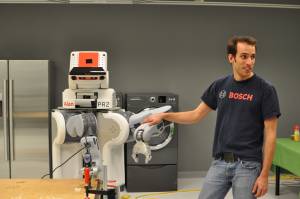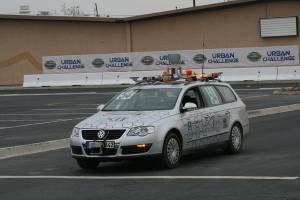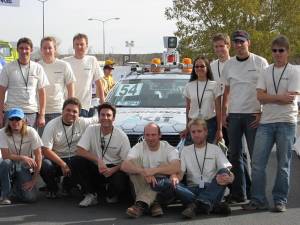Table of Contents
Research
PR2 Remote Lab (2010-2013)
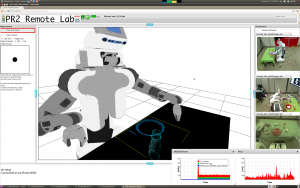 Limited access to quality robotics research platforms is one significant obstacle to the development of new robotics applications. Bosch’s PR2 Remote Lab will extend access to the PR2 platform to additional research labs which did not receive their own PR2.
Limited access to quality robotics research platforms is one significant obstacle to the development of new robotics applications. Bosch’s PR2 Remote Lab will extend access to the PR2 platform to additional research labs which did not receive their own PR2.
The first application for the PR2 Remote Lab is robot learning from demonstration. This research focuses on the development of algorithms that enable humans to teach robots new tasks by showing the robot what to do instead of by programming. The 2011 Robot Learning from Demonstration Challenge, held in conjunction with the AAAI Conference and Robotics Exhibition in San Francisco, will showcase advances in demonstration learning systems. Since not all interested participants may have access to robotic hardware that meets the requirements of the task with respect to sensing and manipulation, researchers will have the option to use a Willow Garage PR2 robot provided through our Bosch PR2 Remote Lab facility.
- Website: http://www.pr2-remotelab.com
- Publications: [icra11b]
PR2 Beta Program (2010-2012)
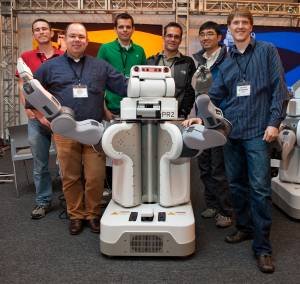 The Autonomous Systems group at Bosch Research has been selected by Willow Garage, Inc. to receive a Personal Robot 2 (PR2). This two-year research program is designed to accelerate research in personal robotics through collaboration within the technical robotics community. The total program is valued at more than $4 million. Bosch is the only corporate organization to receive a PR2 and is one of 11 program recipients, including institutions such as Stanford University and the Massachusetts Institute of Technology.
The Autonomous Systems group at Bosch Research has been selected by Willow Garage, Inc. to receive a Personal Robot 2 (PR2). This two-year research program is designed to accelerate research in personal robotics through collaboration within the technical robotics community. The total program is valued at more than $4 million. Bosch is the only corporate organization to receive a PR2 and is one of 11 program recipients, including institutions such as Stanford University and the Massachusetts Institute of Technology.
In the PR2 Beta Program, we integrate advanced Bosch sensor technology, such as MEMS accelerometers, gyros and force sensors and air pressure sensors, in the PR2 to enable new applications and to accelerate the wide-scale deployment of robot technology in new commercial and private environments. Also, we explore how a human can effectively interact with a PR2. Including a human in the loop will improve the robot’s performance and reliability. These improvements will allow robots to be deployed earlier, at lower cost and in more complex environments. In addition, we use the PR2 for automatic mapping and reconstruction of 3D environments.
Willow Garage's founder, Scott Hassan, challenged the PR2 Beta Site participants to get the PR2 to “do something cool, funny, or useful.” We took up this challenge and within one week we developed the PR2 Mailman, a mail delivery application for the PR2. The video took the second second place and won $3,000 in the PR2 Quick Start Contest.
- ROS Package Website: http://www.ros.org/wiki/bosch-ros-pkg
- News:
Automatic Reconstruction of Textured 3D Models (2008-2009)
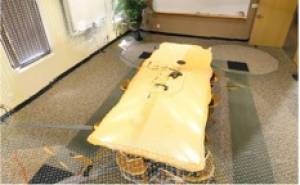 3D reconstruction and visualization of objects and environments is increasingly important, and there is a wide range of application areas where 3D models are required. Reconstructing 3D models has therefore been a major research focus in academia and industry. This project addressed the problem of automatic 3D reconstruction, and we developed a system for unsupervised reconstruction of textured 3D models in the context of modeling indoor environments.
3D reconstruction and visualization of objects and environments is increasingly important, and there is a wide range of application areas where 3D models are required. Reconstructing 3D models has therefore been a major research focus in academia and industry. This project addressed the problem of automatic 3D reconstruction, and we developed a system for unsupervised reconstruction of textured 3D models in the context of modeling indoor environments.
Our data acquisition system was based on a Segway RMP platform which enabled us to automatically acquire large amounts of textured 3D scans in a short amount of time. The first data processing step was registration and mapping. We proposed a probabilistic, non-rigid registration method that incorporated statistical sensor models and surface prior distributions to optimize alignment and the reconstructed surface at the same time. Second, in order to fuse multiple scans and to reconstruct a consistent 3D surface representation, we incorporated a volumetric surface reconstruction method based on a oriented point. For the final step of texture reconstruction, we developed a novel method to automatically generate blended textures from multiple images and multiple scans which were mapped onto the 3D model for photo-realistic visualization.
- Videos:
- Bosch RTC: 3D Mapping link
DARPA Urban Challenge (2006-2007)
Team AnnieWAY was founded in 2006 to participate at the Darpa Urban Challenge and continues to exist as a research platform for the implementation of software and hardware components for autonomous vehicles. Our main research focus is in the development of vision-based sensors for autonomous vehicles, intelligent behavior generation and control strategies for autonomous driving. The team is hosted at the Institute of Measurement and Control at KIT.
The 2007 Darpa Urban Challenge was a competition of autonomous vehicles operating in a complex urban traffic scenario. It was designed to test the possibilities of driverless vehicles in urban traffic. The vehicles had to be able to drive on urban roads, evade obstacles, obey traffic rules, park, turn, and drive in unstructured areas, i. e. areas without lane markings.
Our commitment was rewarded by passing the site visits and the semi finals so that we became one of only 11 finalists. During the finals, our vehicle started successfully. However, an undetected software bug resulted in an endless loop prohibiting the vehicle to finish the competition.
- News:
- Germans Raid Auto-Bot Race, Wired Danger Room: link
